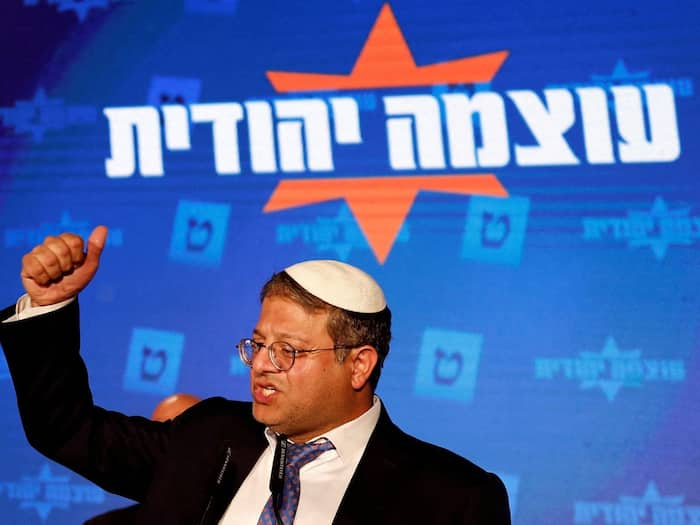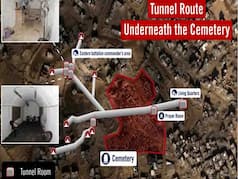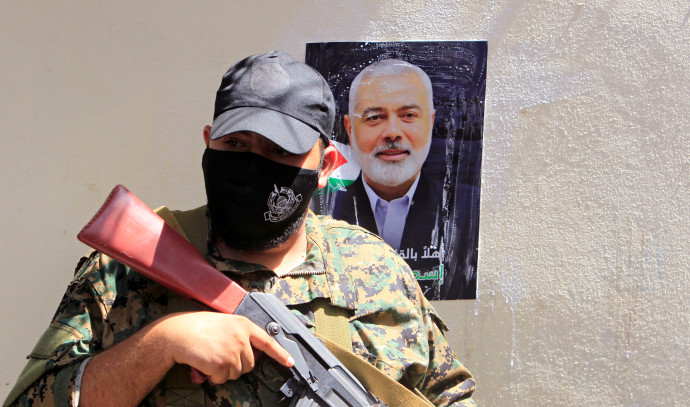
National Security Minister of Israel, Itamar Ben-Gvir
New Delhi: The Israel Hamas War has been going on for more than three months now and the devastating attacks do not seem to stop. The ongoing Israel Palestine Conflict turned into the deadly Israel Hamas War when the latter fired 5000 rockets from Gaza to Israel on October 7, 2023; Israel immediately decided to counter-attack and since then, the war has not stopped. Thousands of lives, on both sides of the war have been lost including women and children; despite objections from other countries and international organisations, the war has continued. However, there have been a few ‘pauses’ in the war for the release of hostages from both sides. But now it seems that the ‘Israel Hamas War’ is turning into an ‘Israel vs Israel’ War with the passing time as the National Security Minister of Israel, Itamar Ben-Gvir has threatened to topple the government. Know the reason behind it…
Israel’s National Security Minister Threatens To Topple Govt
As mentioned earlier, Israel’s National Security Minister, Otzma Yehudit Party leader Itamar Ben-Gvir, threatened on Tuesday to bring down the government if it reaches a “reckless” hostage deal with Hamas. His tweet came amid apparent progress on an agreement to free the 136 captives remaining in Gaza whom the terrorist group abducted during its October 7 attack on communities near the Strip.
Opposition Leader Yair Lapid Responds
In an apparent response to Ben-Gvir’s tweet, opposition leader Yair Lapid wrote on X that his Yesh Atid Party and its 24 Knesset members would give the government full backing for a deal to free the hostages. “In the last 116 days, I met with dozens of families of abductees. I promised them and I repeat my promise: We will give the government a safety net for any deal that will return the abductees to their homes and families. This is our commitment to the abductees and their families, this is our commitment,” Lapid wrote in a lengthy series of tweets.
Hamas Political Bureau Chief Ismail Haniyeh On Peace Talks
Qatar-based Hamas political bureau chief Ismail Haniyeh said on Tuesday that the terrorist group would study a proposal received from negotiations between the interested parties in Paris on Sunday, adding that he would visit Cairo for talks on the initiative. Haniyeh said that the priority for Hamas is an end to Israel’s military offensive in Gaza and a withdrawal of all troops from the coastal enclave. The demand to end the war runs counter to Israel’s stated goal of destroying the terrorist group. On the other hand, the Israeli Prime Minister’s Office has ‘defined’ the Paris meeting as ‘constructive’. However, “there are still significant gaps which the sides will continue to discuss at additional mutual meetings to be held this week.”
Qatari and Egyptians Mediators brought togeter Mossad Chief David Barnea, Israel Security Agency (Shin Bet) Director Ronen Bar and the Israel Defense Forces’ point man Maj. Gen. Nitzan Alon for hostage negotiations at the Paris Talks. To mediate the meeting, Qatari Prime Minister Sheikh Mohammed bin Abdulrahman Al Thani, Abbas Kamel, head of the Egyptian General Intelligence Directorate, and CIA Director William Burns were also present.
What Is The New Israel Hamas Hostage Deal?
Various unconfirmed reports say that this new agreement would include the release of more than 100 hostages and there might be a ceasefire of two months; prison sentences of unspecified number of Palestinian terrorists would be commuted and amount of humanitarian aid being brought to the Gaza Strip would be increased by Israel.
(Inputs from ANI)
Hamas leader Ismail Haniyeh said on Tuesday that the group had received a ceasefire proposal put forward after talks in Paris and would study it, adding he would visit Cairo for discussions on the plan.
Haniyeh said the group’s priority was to end Israel’s military offensive and a full pullout of Israeli forces from Gaza. On Monday night, Hamas rejected the hostage deal drafted in Paris because it did not include a permanent ceasefire.
Hamas and the Popular Front for the Liberation of Palestine (PFLP) reiterated that Israel must halt its Gaza offensive and withdraw from the Strip before any prisoner exchange takes place, Hamas said in a statement on Monday.
In Washington, US Secretary of State Antony Blinken said that the proposal handed to Qatar, “was a strong one and a compelling one that offers some hope that we can get back to this process, but Hamas will have to make its own decisions.”
Blinken spoke amid optimism on the part of the US and Qatar, which along with Egypt is mediating a deal, that a framework had been found for an agreement.
A hostage deal has been a top US priority from day 1, Blinken stated.
Hostages who were abducted by Hamas terrorists as part of a hostages-prisoners swap deal between Hamas and Israel, November 30, 2023 (credit: Hamas Military Wing/Handout via REUTERS)
Qatari Prime Minister Mohammed Al-Thani indicated that a hostage deal would be phased with women and children first, as he described the framework agreement that emerged from the Paris talks.
Advertisement
The initial plan for hostage release deal
“The framework that was agreed yesterday with all the parties was a framework based on what has been proposed by the Israelis and what has been a counter-proposal by Hamas,” Thani said during a public interview at an event hosted by think-tank The Atlantic Council.
“We tried to blend things,” he said, adding that this new proposal would now be relayed to Hamas.
Thani arrived from Paris, where he participated in closed-door talks on a deal with CIA Chief William Burns, Mossad Chief David Barnea, Shin Bet Chief Ronen Bar, hostage negotiator Maj.-Gen. (res.) Nitzan Alon, the head of the Egyptian Intelligence Services Abbas Kamel.
Thani said that Hamas rescinded its demand for a permanent ceasefire ahead of any negotiations, but “we moved from that place” to one that could lead to a ceasefire, “which we are all hoping for.”
NBC News Chief Washington Correspondent Andrea Mitchell, who conducted the interview together with David Ignatius of The Washington Post, asked Thani about the details of the deal.
Mitchell explained she understood that there would be “a phased pause in the fighting women and children first, and to continue this in phases as you proceed, with aid going in as well.”
Thani responded, “You are well informed.”
He described how one of the stumbling blocks to the deal had been a Hamas demand for a permanent ceasefire before holding talks, noting that this has now been rescinded.
“There was a clear demand of the permanent ceasefire ahead of the negations,” Thani said, explaining that Qatar had moved Hamas “from that place”, to one “that can lead to a ceasefire in the future. This is what we are all aiming for,” he stated.
The goal of the talks is to free the hostages and to stop the Israeli bombing in Gaza, Thani added.
Advancement in the talks comes as the US is weighing retaliatory military action for an attack that killed three troops in Jordan. Thani said he hoped this would not undercut progress toward a new Israel-Hamas hostage release deal.
“I hope that nothing would undermine the efforts that we are doing or jeopardize the process,” Thani said.
US National Security Council spokesperson John Kirby told MSNBC News that a framework exists for a deal to release the hostages, but he cautioned that nothing had been finalized.
“A lot of promise here, but again, I want to be very clear, there is still diplomacy ahead of us, a lot of discussions to occur before we can get there,” Kirby said.
He clarified, however, that “we don’t have a deal on the table and imminently ready to be announced.”
The US does “think that there is a framework here for another hostage deal that could make a difference in terms of getting more hostages out, getting more aid in, and getting the violence to calm down and that would reduce civilian casualties,” Kirby stated.
He later told reporters that the push was for “a humanitarian pause of sufficient duration that will allow a large number of hostages to be released.” During that period, more humanitarian assistance and go in and casualties will be reduced, Kirby said.
The broad framework under discussion has focused on an exchange of captives for the release of Palestinian security prisoners or terrorists, as well as a pause in the war.
It is presumed that the deal to free the 136 captives would be done in stages, as occurred with the November deal, during which 105 captives were freed during a week-long lull in fighting.
Hamas seized some 253 captives on October 7. KAN News reported that the latest bid to free the hostages included three phases, with the first one focusing on 40 captives including women, children, the elderly, and those who are sick.
The second phase would include male adults who are not soldiers, and the third phase would be for the soldiers, including the female ones.
Part of the deal would include the release of thousands of Palestinian security prisoners, including those convicted of terror offenses, but this latter group is only likely to be part of the agreement at the end.
Hamas said on Monday that releasing hostages it is holding would require a guaranteed end to the war and a full IDF withdrawal.
“The success of the Paris meeting is dependent on the Occupation (Israel) agreeing to end the comprehensive aggression on Gaza Strip,” senior Hamas official Sami Abu Zuhri told Reuters.
Hamas previously said a full release would require that Israel free all of the thousands of Palestinians held on security grounds in its prisons.
A Palestinian official, close to mediation talks, who requested anonymity, said that for Hamas to sign a follow-up deal to the November truce in which it released dozens of hostages, it wants Israel to agree to end the offensive and withdraw from Gaza – through implementation would not necessarily be immediate.
The agreement would have to be endorsed by Qatar, Egypt, and the US, the official said.
Israel has insisted it has no plan to end the war until Hamas is defeated or to relinquish security control of Gaza. One compromise position, however, could be that it would temporarily withdraw from selected target areas.
In an interview with Douglas Murray on Talk TV, Prime Minister Benjamin Netanyahu continued to stress that Qatar could do more to secure a deal, particularly given that top Hamas leadership lived in its country.
“We should demand from Qatar to use their leverage to achieve the release of the remainder of our hostages” as well as to provide proof that hostages have received medications as part of an existing deal with Hamas.
Qatar “has considerable influence [on Hamas] and I expect them to use it,” he stated.
Thani pushed back at Netanyahu’s assertions that the military campaign was an important pressure lever to free the hostages. He said it was “not getting any results to get the hostages back” and that diplomacy was the best route to secure their return.
He also denied claims that Qatar had any special leverage over Hamas, explaining that to the extent it gave them influence, then his country was using that to negotiate a deal.
Qatar’s role is as a mediator that offers solutions, “We do not see that Qatar is a superpower that can impose something on this party.”
reported.
The rejection came after Israel reportedly agreed to the plan during negotiations in Paris, aiming to secure the release of hostages held by the militant group.
Hamas, along with the Popular Front for the Liberation of Palestine, issued a joint statement insisting that any agreement must include an end to the ongoing conflict and a complete withdrawal of Israeli troops from Gaza. The group emphasised that Israel must cease its “aggression” before any exchange deal can be considered, as reported by The Times of Israel.
A senior Hamas official expressed the group’s desire for a “complete and comprehensive ceasefire” in Gaza, a condition that seemingly contradicts earlier demands for an immediate end to hostilities.
The proposed agreement, crafted during a meeting involving heads of the Mossad and Shin Bet
intelligence agencies along with US, Qatari, and Egyptian officials, outlines a phased process.
The deal would involve the release of all Israeli hostages, starting with vulnerable groups such as women, children, the elderly, and the sick. “Phased pauses” in Israel’s offensive against Hamas would occur during the hostage release process.
According to the deal, Israel would also allow more aid into Gaza and would release very large numbers of Palestinian prisoners.
The Times of Israel, citing Channel 12 news, reported that the offer centres around a 45-day pause in the fighting in exchange for 35-40 hostages in the first stage. Around 100-250 Palestinian prisoners will be released for every hostage. This will be followed by further releases in exchange for an extension of the truce and a larger ratio of Palestinian security prisoner releases for each hostage.
The framework reportedly does not establish a permanent ceasefire but leaves the possibility open. The agreement also includes provisions for increased humanitarian aid into Gaza and the release of a substantial number of Palestinian prisoners.
While Qatar’s Prime Minister Mohamed bin Abdulrahman Al Thexpressed optimism about progress in negotiations, stating that Hamas had potentially shifted its stance, Israel remains cautious. The Israeli Prime Minister’s Office issued a statement neither confirming nor denying the existence of a deal but noted that the reports included conditions “not acceptable to Israel.”
Israeli officials told The Times of Israel on Monday that they are being cautious. “There is still a long road ahead,” one official said.
“We are in a much better place than we were a few weeks ago,” Qatari Prime Minister Mohammed bin Abdulrahman Al Thani
said at the Atlantic Council in Washington, DC.
“Yesterday, good progress was made to get things back in shape and at least to lay a foundation for the way forward,” the Qatari PM added, saying the proposal would be relayed to Hamas.
Al Thani also said that an agreement might lead to a permanent ceasefire “in the future.”
The situation remains fluid, with conflicting statements from both sides, and the war cabinet in Israel is scheduled to meet to discuss the ongoing negotiations.
Prime Minister Benjamin Netanyahu
‘s office confirmed a four-way meeting involving the US, Israel, Qatar, and Egypt to discuss a potential deal with Hamas. The talks were deemed “constructive,” but there are still significant gaps to be addressed in subsequent meetings.
“There are still significant gaps that the sides will discuss this week in additional meetings,” the PMO added.
CIA Director Bill Burns discussed the emerging agreement with David Barnea, the head of the Mossad intelligence agency, Qatar’s Al Thani and Egyptian intelligence chief Abbas Kamel.
It’s believed that 132 hostages abducted by Hamas on October 7 are still held in Gaza.
Hamas demands an end to the war and IDF withdrawal as conditions for their release, terms Israel rejects.
The war erupted on October 7, after Hamas-led terrorists from the Gaza Strip carried out a massive attack on Israel that killed nearly 1,200 people, mostly civilians.
Hamas and other terrorists also abducted 253 people of all ages, mostly civilians, into Gaza.
This was followed by a military campaign by Israel in Gaza which killed at least 26,637 people and 65,387 wounded.
Netanyahu faces pressure from hostage families, with rallies in Tel Aviv calling for a deal. About 100 hostages were released in November under a ceasefire deal.
The IDF confirmed 28 deaths among those still held by Hamas, The Times of Israel reported.





